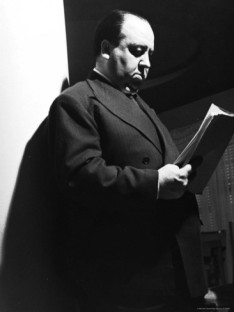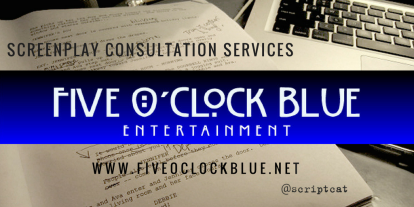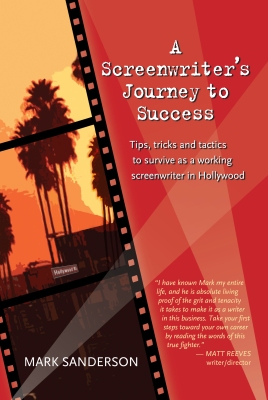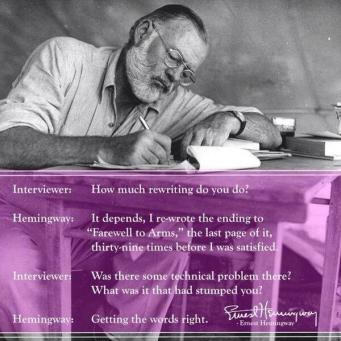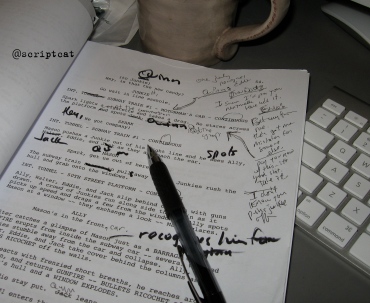 I hope you’ve been creating new opportunities that have pushed your screenplays closer to success. Trust me, I know if can feel like you’re banging your head against a wall hoping for a breakthrough, but finding the same results of rejection and criticism. I truly hope you’re busy creating a solid body of work and forging ahead on your screenwriting journey. I hope that I’ve been able to offer a few nuggets of advice that you’ve found helpful. In addition to my tips on Twitter (@scriptcat), my Youtube Channel . I’ll be posting new tips here every month in addition to new articles. Dig in as I’ve written over 180 articles on this blog. I’m also broadcasting live on the new app PERISCOPE. Check it out. Thanks for reading and as always: Carry on, keep the faith and keep screenwriting. Okay, let’s cut to the chase and get right to the action—here are a few more useful survival tips for your journey…
I hope you’ve been creating new opportunities that have pushed your screenplays closer to success. Trust me, I know if can feel like you’re banging your head against a wall hoping for a breakthrough, but finding the same results of rejection and criticism. I truly hope you’re busy creating a solid body of work and forging ahead on your screenwriting journey. I hope that I’ve been able to offer a few nuggets of advice that you’ve found helpful. In addition to my tips on Twitter (@scriptcat), my Youtube Channel . I’ll be posting new tips here every month in addition to new articles. Dig in as I’ve written over 180 articles on this blog. I’m also broadcasting live on the new app PERISCOPE. Check it out. Thanks for reading and as always: Carry on, keep the faith and keep screenwriting. Okay, let’s cut to the chase and get right to the action—here are a few more useful survival tips for your journey…
TIP #1
KEEP THE INTIMATE DETAILS ABOUT YOUR WORK TO YOURSELF.
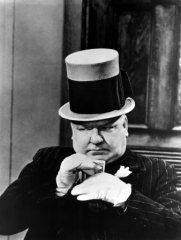 I see too many screenwriters doing this and expending precious energy and opening themselves up to early criticism. Do not continually talk about the status of your projects, your “writing process,” or how each project is moving forward. Hollywood has a bizarre time warp that works on its own schedule. Every project will take longer than you ever expected and you don’t need people thinking that you’re blowing smoke when you talk about the status of your material. The truth is that it takes an incredible amount of time for any script to find a home and eventually get produced—if ever. Sometimes the less you say about your progress the better. We all have our own inner voice of self-doubt, but why give fodder to your critics and skeptics who will use it to squash your dreams? They’ll even taint any good news you share and use it to belittle your success because they didn’t have the guts to risk everything to pursue their own dreams. They enjoy raining on your parade instead. Protect your dreams and cut the naysayers out of your life. Keep your work close to the vest until it’s finished.
I see too many screenwriters doing this and expending precious energy and opening themselves up to early criticism. Do not continually talk about the status of your projects, your “writing process,” or how each project is moving forward. Hollywood has a bizarre time warp that works on its own schedule. Every project will take longer than you ever expected and you don’t need people thinking that you’re blowing smoke when you talk about the status of your material. The truth is that it takes an incredible amount of time for any script to find a home and eventually get produced—if ever. Sometimes the less you say about your progress the better. We all have our own inner voice of self-doubt, but why give fodder to your critics and skeptics who will use it to squash your dreams? They’ll even taint any good news you share and use it to belittle your success because they didn’t have the guts to risk everything to pursue their own dreams. They enjoy raining on your parade instead. Protect your dreams and cut the naysayers out of your life. Keep your work close to the vest until it’s finished.
TIP #2
PROTECT YOUR PRECIOUS WRITING TIME.
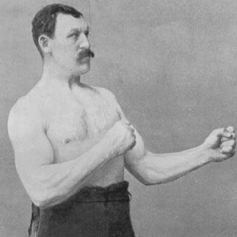 Time is a screenwriter’s greatest asset or worst enemy—it depends on how to you use it. Carve out a writing schedule and stick to it. You need to protect your precious writing time and treat it like a job because it will be exactly the same when you finally do get paid—but you’ll have the added pressure of being under contract, being paid and having the producer expecting “great things!” When you sit down to write, you’ve probably experienced the battle to defend your time against the forces of procrastination and interruption. Hemingway said, “Work every day. No matter what has happened the day or night before, get up and bite on the nail.” Working every day, even if it’s for a short period of time, creates discipline. The longer you write the more you’ll get to know yourself better as a writer. You’ll discover your strengths and weaknesses, if you write fast or slow, and if you’re easily distracted or if you can work in a crowded coffee shop. When the writing gets difficult, time becomes your enemy as you never know each day if your creative juices will flow or dry up. Do yourself a favor and always protect your precious writing time from the forces of interruption and distraction. You’ll keep on schedule, writing will become a habit, and you will be acting like the professional you’ve become.
Time is a screenwriter’s greatest asset or worst enemy—it depends on how to you use it. Carve out a writing schedule and stick to it. You need to protect your precious writing time and treat it like a job because it will be exactly the same when you finally do get paid—but you’ll have the added pressure of being under contract, being paid and having the producer expecting “great things!” When you sit down to write, you’ve probably experienced the battle to defend your time against the forces of procrastination and interruption. Hemingway said, “Work every day. No matter what has happened the day or night before, get up and bite on the nail.” Working every day, even if it’s for a short period of time, creates discipline. The longer you write the more you’ll get to know yourself better as a writer. You’ll discover your strengths and weaknesses, if you write fast or slow, and if you’re easily distracted or if you can work in a crowded coffee shop. When the writing gets difficult, time becomes your enemy as you never know each day if your creative juices will flow or dry up. Do yourself a favor and always protect your precious writing time from the forces of interruption and distraction. You’ll keep on schedule, writing will become a habit, and you will be acting like the professional you’ve become.
TIP #3
TALK IS CHEAP IN HOLLYWOOD!
 You’ll learn the longer you pursue a screenwriting career that talk is cheap in Hollywood and people want credit for their good intentions. Too many times the words are empty promises that end up wasting an eager and hungry writer’s time. Money makes it real. Take everything as face value for talk is the cheapest commodity in Hollywood. Many times interest in you or your script and the endless talk is just that—interest and talk. Many times meetings are just meetings. Many times a producer’s upbeat attitude about your project can become infectious. You want to believe that others see your dream and can realize it. Why not? It’s what keeps us going as screenwriters—belief in our projects and the faith that success is just around the corner. I’m sure when producers and executives tell you that your project is going into production, they just might believe it themselves, but sometimes they tell a writer this to buy more free time. Producers want to keep a writer’s interest in hanging on until they “work out the pesky financing details” and it becomes the bait for more free work. If they can’t raise the money for the budget or they have no money in their development budget, there really is no money to pay the writer. Be understanding to a certain point and look at every situation through a risk/benefit filter. Are you willing to risk your free time with free rewrites on the possible chance a project “might” get produced? Get excited when a producer gives you a contract, you both sign it and you get paid. That’s the professional way—otherwise, you can’t live on the currency of good intentions. Now get back to your blank pages. If you stop writing you’re guaranteed never to have any chance at success.
You’ll learn the longer you pursue a screenwriting career that talk is cheap in Hollywood and people want credit for their good intentions. Too many times the words are empty promises that end up wasting an eager and hungry writer’s time. Money makes it real. Take everything as face value for talk is the cheapest commodity in Hollywood. Many times interest in you or your script and the endless talk is just that—interest and talk. Many times meetings are just meetings. Many times a producer’s upbeat attitude about your project can become infectious. You want to believe that others see your dream and can realize it. Why not? It’s what keeps us going as screenwriters—belief in our projects and the faith that success is just around the corner. I’m sure when producers and executives tell you that your project is going into production, they just might believe it themselves, but sometimes they tell a writer this to buy more free time. Producers want to keep a writer’s interest in hanging on until they “work out the pesky financing details” and it becomes the bait for more free work. If they can’t raise the money for the budget or they have no money in their development budget, there really is no money to pay the writer. Be understanding to a certain point and look at every situation through a risk/benefit filter. Are you willing to risk your free time with free rewrites on the possible chance a project “might” get produced? Get excited when a producer gives you a contract, you both sign it and you get paid. That’s the professional way—otherwise, you can’t live on the currency of good intentions. Now get back to your blank pages. If you stop writing you’re guaranteed never to have any chance at success.
Keep writing and filling your pages because if you stop—you’re guaranteed to never have any shot at success. This is a business with no guarantees even when you do sell a screenplay.
@Scriptcat out!
Also subscribe to my new YOUTUBE CHANNEL with weekly screenwriting video tips.
Do you lack focus or haven’t set goals for the year with regards to your career? Check out my on-demand webinar “A SCREENWRITER’S CHECKLIST — 10 Questions Every Screenwriter Must Answer to Stay in the Game.”
Part One & Two available for a streaming rental—$14.99 each.
(click on the icon below for the link to the streaming rental)
Did you just complete your latest magnum opus? Time for in-depth screenplay consultation? Check out my services by clicking on the blue icon below for the link to my website and more information.
“Do you have the patience to wait until your mud settles and the water is clear?” ― Lao Tzu, Tao Te Ching
“The time we have alone; the time we have in walking; the time we have in riding a bicycle; are the most important times for a writer. Escaping from a typewriter is part of the creative process. You have to give your subconscious time to think. Real thinking always occurs on the subconscious level.”—Ray Bradbury
“I never feel the need to discuss my work with anyone. No, I am too busy writing it. It has got to please me and if it does I don’t need to talk about it. If it doesn’t please me, talking about it won’t improve it, since the only thing to improve it is to work on it some more. I am not a literary man but only a writer. I don’t get any pleasure from talking shop.”—William Faulkner
“Deliberate practice, by its nature, must be hard. When you want to get good at something, how you spend your time practicing is far more important than the amount of time you spend. Regular practice simply isn’t enough. To improve, we must watch ourselves fail, and learn from our mistakes.”—Florida State University’s Anders Ericsson
“If you’re worried about failing, you ought to get into a different business, because statistics will tell you that sixty or seventy percent of the time you’re going to fail. By fail I mean that the movie won’t make money. Just do the best you can every time. And if you’re going to stay in the movies, and you like movies—and I love them—you’d better love them a lot, because it’s going to take all of your time. If you want to be in the movies, it’s going to break your heart.“—Richard Brooks, director of Blackboard Jungle, Sweet Bird of Youth, In Cold Blood, Looking for Mr. Goodbar
“Ultimately, we all have to decide for ourselves what constitutes failure. But the world is quite eager to give you a set of criteria if you let it. [F]ailure means a stripping away of the inessential. I stopped pretending to myself to be anything other than what I was, and began to direct all my energy into finishing the only work that mattered to me. Had I really succeeded at anything else, I might never have found the determination to succeed in the one arena where I believe I truly belonged. [R]ock bottom became the solid foundation on which I built my life.” ~ J.K. Rowling

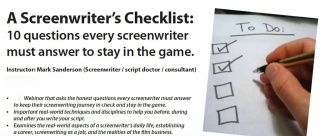

 I’m guilty. I used to do this too before I learned how damaging it can be to a screenwriter’s mind and screenplay. You finish your screenplay and you’re surging with a natural creative high that you want to share with the world. This is the time to step back and take a pause. Allow your script to sit for a few days and do no read it. You’ll be tempted to give it to any of your friends bugging you to read your script when it’s done. Do not let anyone read it. Fight the temptation to share it at this point. It’s your first draft and it will definitely need more work—but this is delicate process and one a screenwriter must do alone and without anyone’s input at this point in the journey. It’s now just you and your screenplay—creator and project—alone together again.
I’m guilty. I used to do this too before I learned how damaging it can be to a screenwriter’s mind and screenplay. You finish your screenplay and you’re surging with a natural creative high that you want to share with the world. This is the time to step back and take a pause. Allow your script to sit for a few days and do no read it. You’ll be tempted to give it to any of your friends bugging you to read your script when it’s done. Do not let anyone read it. Fight the temptation to share it at this point. It’s your first draft and it will definitely need more work—but this is delicate process and one a screenwriter must do alone and without anyone’s input at this point in the journey. It’s now just you and your screenplay—creator and project—alone together again.
